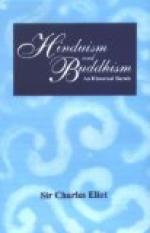It contains a code of ten primary and forty-eight secondary commandments, worded as prohibitions, but equivalent to positive injunctions, inasmuch as they blame the neglect of various active duties. The ten primary commandments are called Pratimoksha and he who breaks them is Parajika,[861] that is to say, he ipso facto leaves the road leading to Buddhahood and is condemned to a long series of inferior births. They prohibit taking life, theft, unchastity, lying, trading in alcoholic liquors, evil speaking, boasting, avarice, hatred and blasphemy. Though infraction of the secondary commandments has less permanently serious consequence, their observance is indispensable for all monks. Many of them are amplifications of the ten major commandments and are directed against indirect and potential sins, such as the possession of weapons. The Bhikshu may not eat flesh, drink alcohol, set forests on fire or be connected with any business injurious to others, such as the slave trade. He is warned against gossip, sins of the eye, foolish practices such as divination and even momentary forgetfulness of his high calling and duties. But it is not sufficient that he should be self-concentrated and without offence. He must labour for the welfare and salvation of others, and it is a sin to neglect such duties as instructing the ignorant, tending the sick, hospitality, saving men or animals from death or slavery, praying[862] for all in danger, exhorting to repentance, sympathy with all living things. A number of disciplinary rules prescribe a similarly high standard for daily monastic life. The monk must be strenuous and intelligent; he must yield obedience to his superiors and set a good example to the laity: he must not teach for money or be selfish in accepting food and gifts. As for creed he is strictly bidden to follow and preach the Mahayana: it is a sin to follow or preach the doctrine of the Sravakas[863] or read their books or not aspire to ultimate Buddhahood. Very remarkable are the injunctions to burn one’s limbs in honour of Buddhas: to show great respect to copies of the scriptures and to make vows. From another point of view the first and forty-seventh secondary commandments are equally remarkable: the first bids officials discharge their duties with due respect to the Church and the other protests against improper legislation.
The Fan-wang-ching is the most important and most authoritative statement of the general principles regulating monastic life in China. So far as my own observation goes, it is known and respected in all monasteries. The Pai-chang-ch’ing-kuei[864] deals rather with the details of organization and ritual and has not the same universal currency. It received the approval of the Yuan dynasty[865] and is still accepted as authoritative in many monasteries and gives a correct account of their general practice. It was composed by a monk of Kiang-si, who died in 814 A.D. He belonged to the Ch’an school, but his rules are approved by others. I will not attempt to summarize them, but they include most points of ritual and discipline mentioned below. The author indicates the relations which should prevail between Church and State by opening his work with an account of the ceremonies to be performed on the Emperor’s birthday, and similar occasions.




